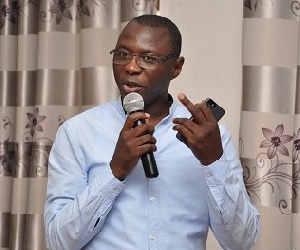The Africa Centre for Energy Policy (ACEP) has described as a “bad deal” Government’s quest to import emergency power plants into the country to mitigate the current power crisis.
Among the emergency power measures is the importation of two 450-Megawatt capacity barges from Karpower at a cost of $250 million.
Also, 250-Megawatts generating units from Dubai are being brought into the country in addition to a 300-Megawatt emergency plant by General Electric.
As far as the 450-Megawatt capacity barges are concerned, Executive Director of the think tank, Dr Mohammed Amin Anta told journalists at a press conference that: “There will still be structural issues that need to be addressed even when the lease agreement is completed.”
The Africa Centre for Energy Policy (ACEP) has described as a “bad deal” Government’s quest to import emergency power plants into the country to mitigate the current power crisis.
Among the emergency power measures is the importation of two 450-Megawatt capacity barges from Karpower at a cost of $250 million.
Also, 250-Megawatts generating units from Dubai are being brought into the country in addition to a 300-Megawatt emergency plant by General Electric.
As far as the 450-Megawatt capacity barges are concerned, Executive Director of the think tank, Dr Mohammed Amin Anta told journalists at a press conference that: “There will still be structural issues that need to be addressed even when the lease agreement is completed.”
“We need to establish the state of the machines, and prepare the place where they will be anchored offshore: The Tema site near the fishing harbour is yet to be prepared for the mooring and operation of the plant.
“Experts say that this will be ready, at best, in the last quarter of 2015. We also need to work on the transmission interconnection. If these arrangements have not been factored into the timetable for deploying the barges, I am afraid it may be a dream,” Dr Amin Anta said.
In connection with the 250-Megawatt plants, he said: “This arrangement is a lease based on build-own-operate-and-transfer (boot) with a total of 250 Megawatts of emergency power from Ameri Energy Group of Dubai.”
“The Units consist of 10 sets of GE TN2500 power plants each consisting of 25MW. The Equipment supplier is APR Energy of the US: a company specialised in the rental and operation of emergency power units.”
According to him, $700 million will eventually be spent on leasing the barges for five years before Ghana takes ownership of them when the State could have spent just about $222 million for an outright purchase.”
In his view, the GE-built plants which are being purchased from Dubai have no value for money.
Ghana is currently shedding between 400 and 700 Megawatts of power during off-peak and peak periods, respectively due to a shortfall in production.
The crisis has come about as a result of poor water levels in the three dams, lack of gas flow from the West Africa Gas Pipeline in Nigeria to thermal plants in Ghana for production as well as the breakdown of some plants. The crisis is taking a toll on Industry, businesses and domestic consumers. Power Minister Dr Kwabena Donkor has promised to resign if he fails to resolve the crisis by the end of December this year.
General News of Tuesday, 3 March 2015
Source: starrfmonline.com
Ending 'dumsor': Emergency plants bad deal – ACEP
Entertainment
















